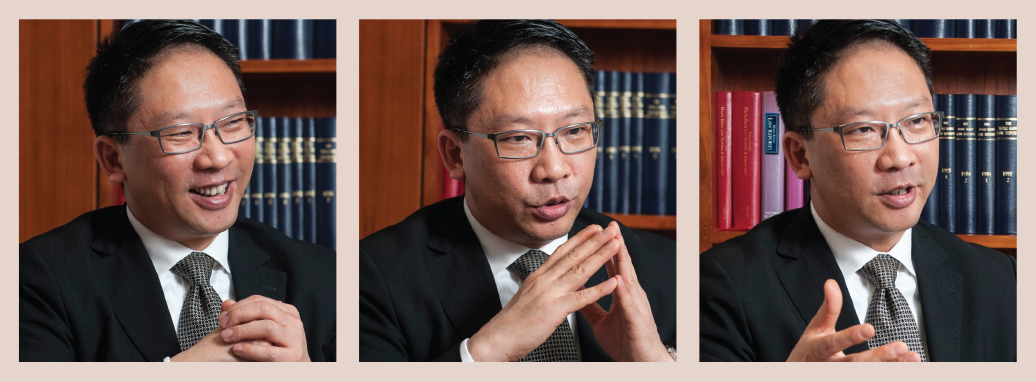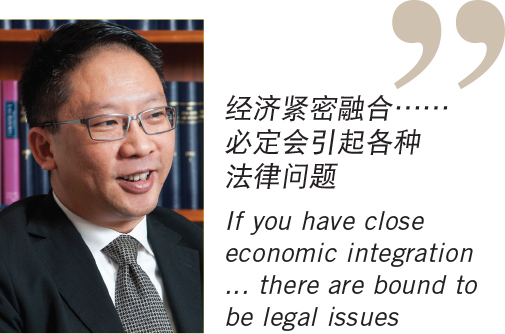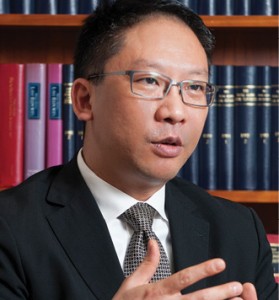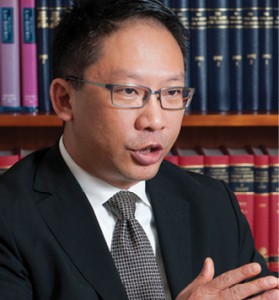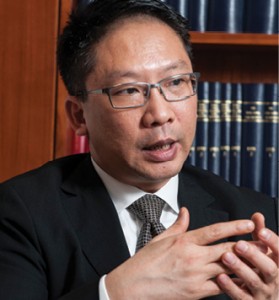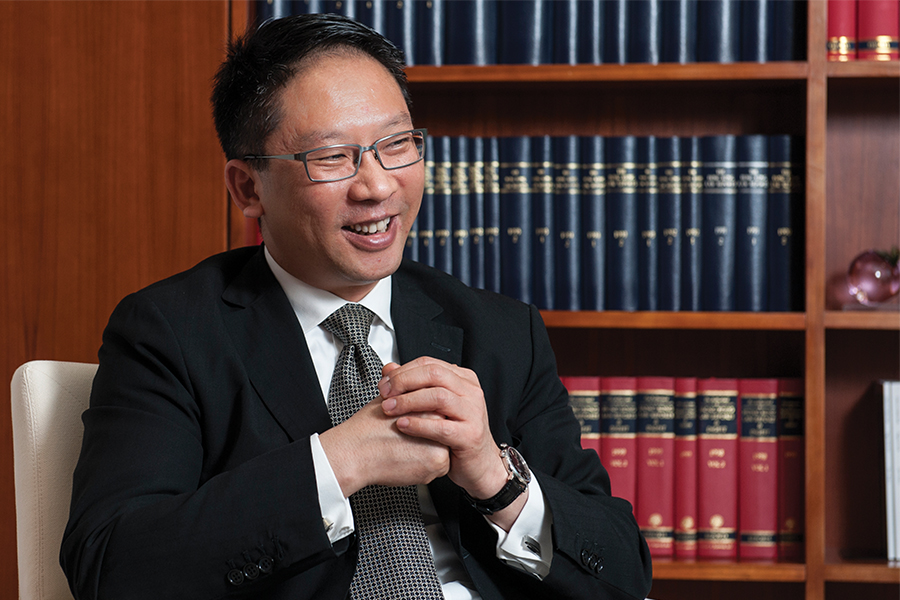Of all the portfolios in the Hong Kong government, Secretary for Justice is arguably the toughest. John Church talks with incumbent Rimsky Yuen about his work, visions, and building bridges between two very different legal systems
As head of the Justice Department, the Secretary oversees 1,000-plus employees on prosecutions, civil law, legal policy and law drafting, among other things. As the top law enforcement official, the position is a principal official of the Hong Kong government, charged with the universally monitored task of upholding the rule of law. And as chief legal adviser to the SAR administration in an increasingly polarised Hong Kong political landscape, the Secretary shoulders a mountain that, to steal the words of one philosopher, would make Atlas shrug.
Enter Rimsky Yuen SC, the third Secretary since Hong Kong’s return to China, in the footsteps of predecessors Wong Yan-lung and Elsie Leung, the former keeping a low profile and the latter commanding almost a stage of her own during their respective tenures. Yuen, it could be said, is a curious mixture of both. Educated in Hong Kong’s best universities, yet from a humble working class background, he has the hallmarks of a high achiever. He was called to the Hong Kong Bar in 1987 and later became chairman of the Hong Kong Bar Association.
A lawyer’s lawyer, his sense of justice is obvious, as is a sharp intellect tethered behind a pair of steel-framed spectacles and a poker face that gives very little away, unless he wishes. Underestimating Rimsky Yuen would be inadvisable, as would oversimplifying the role he is playing in building the channels of communication necessary for the legal systems of Hong Kong and mainland China to relate to each other.
China Business Law Journal caught up with the Secretary just over a year into his tenure to talk about key legal developments on commercial matters between Hong Kong and the mainland, the differences that remain between the two jurisdictions, and his own priorities in the job.
His first year was a baptism by fire, one might say, with right of abode issues and a certain extradition furore with the US dominating headlines at home and around the world, so we asked him what he believes his toughest challenge has been so far.
“I won’t say which is toughest, because it’s interesting that each issue or case had different issues to tackle,” he says. “For instance, the mainland children [right of abode] case, the Court of Final Appeal [CFA right of abode] case involving the overseas maids, the recent one involving [US political refugee and divulger of state secrets Edward] Snowden – all of these are cases that are not easy to deal with.
“As I’ve been telling my friends, this is one of the main differences between working as a barrister in private practice and taking up this role as Secretary for Justice. In the past, when I was practising, I only needed to give legal advice. Now, sometimes I have to make the decision, sometimes I have to advise other colleagues before they make decisions, and in the course of which the legal consideration of course is important, but I would also have to see relevant factors such as policy issues or other relevant issues. For me it was a very sharp learning curve.”
Perhaps demonstrative of the Secretary’s competitive nature is that he has said it was leaving his comfort zone that attracted him to the job in the first place – and that now drives him forward. “In private practice I don’t think I would have a chance to come across the things that I have come across, or to learn some of the things that I now have the chance to learn. That’s the attraction and that remains so, although slightly more than one year [in office] is only a short time.”
A wry smile from him here, and a short time indeed, with an even shorter honeymoon given the issues he has just mentioned, but there are many more that require attention. In the pages of China Business law Journal, corporate counsel and lawyers from both jurisdictions have expressed concerns that the Hong Kong and central governments need to work more closely to address and resolve jurisdictional and enforcement issues. Some of the issues raised have included: the difficulty for Hong Kong authorities in getting evidence from the mainland for use in civil (or criminal) proceedings, either in documentary form or from witnesses; no agreement for surrender of fugitives between the two jurisdictions; no predictable process for the service of Hong Kong court orders in the mainland, or vice-versa; and the recognition and enforcement of judgments between mainland China and Hong Kong being fraught with difficulty.
Yuen says he is acutely aware of calls from legal professionals, and other sectors of the community, for the mainland and Hong Kong systems to work more closely together on jurisdictional and enforcement issues, but he approaches this issue “from a slightly broader perspective”.
“We now talk about Greater China – comprising Hong Kong, Macau, Taiwan and the mainland,” he says. “The interesting bit is the four jurisdictions have very different legal histories and cultures, and yet we are economically very close and will get more and more so in the years to come.
“From a legal perspective, if you have close economic integration and much economic activity, there are bound to be legal issues arising from such activity. The question would then be, how do you deal with the differences between the four jurisdictions?
“So far, focusing between Hong Kong and the mainland, we have admittedly only limited forms of mutual legal assistance, whether from the civil or criminal perspective. In the civil, we have service of documents, we have enforcement of civil judgments if you nominate the specific court pursuant to the special arrangement, we have the arbitration aspect.
“But one asks the question: are they sufficient to tackle the current extent and degree of economic trade activities between Hong Kong and China? And one would say, it’s definitely not sufficient.”
Yuen hastens to add that progress is being made, for example in the area of family law, to deal with an increase in marriages between Hongkongers and mainland Chinese. Such small steps are necessary before larger ones.
“Recently there has been constructive or positive progress in the context of mutual legal assistance, and we will be having more, I would say, meetings between the mainland and Hong Kong on different levels; so the talks will be more progressive and we aim to sort out mutual legal assistance in both the civil as well as the criminal context.
“The other aspect is with Macau and Taiwan. Of course things are practically more complicated, but we are trying to work out stronger ties with Taiwan.
“One aspect we are working on is the enforcement of arbitration awards. We completed the arrangement with the mainland in 1999, and this year, in January, we signed with Macau. In July I went to Legco [Hong Kong’s Legislative Council] to introduce amendments to the Arbitration Ordinance. We anticipate everything to come into effect towards the end of this year. By the end of 2013, Hong Kong will have reciprocal enforcement with the mainland and Macau. What is left is Taiwan, and we want to complete that picture.
“In terms of Macau, we have a lot to work on, both civil and criminal. We cannot avoid these issues and in my view they will happen more frequently in future because of more interchange between the four jurisdictions.”
Defining a vision for the future of mainland-Hong Kong co-operation on civil and commercial matters is as difficult as it sounds, but Yuen offers some insight on where he sees problems and how the two legal jurisdictions might move forward.
“I think there are two very different schools of philosophy,” he says. “One is to have a very general overall framework for all civil matters in the context of mutual legal assistance, and another general framework for criminal matters.
“Another quite opposite school of thought believes it would be difficult to have an overarching scheme, so let’s do it bit by bit. For example, why not have a mutual legal assistance scheme for matrimonial disputes first. And then let’s go down the list and see what other areas require mutual legal assistance.
“My approach would be, because we definitely need some form of mutual legal assistance, and all parties would no doubt agree that the sooner we have it the better, I advocate the approach of let’s tackle the easier issues first. Once we have something we have implemented, then we can gain the experience and we can build up a workable approach, at the same time without losing sight that when we deal with individual issues, we need to have the overall rationale and philosophy in terms of mutual legal assistance.
“In adopting this approach, I hope we can build up more areas of mutual legal assistance. Matrimonial and family law would come first because there is real need – more cross-border marriages and cases before the courts have highlighted problems.
“Commercially, you will have to look at the choice of court agreement and the choice of law agreement aspects, because in the commercial context the governing law in the event of a dispute, and which venue would be solving the dispute, would be of crucial importance to the parties, so that would be another aspect.
“A third aspect in terms of mutual legal assistance would be issues concerning the surrender of fugitives. Hong Kong and China are so close physically, geographically, and … it would not be in the interest of either Hong Kong or the mainland if we do not have a proper scheme for handling the surrender of fugitives. In fact, it’s interesting to note that Hong Kong has a lot of arrangements with other countries and yet we don’t have one with our own country, so it doesn’t really make sense, to be honest.”
It’s no secret that the Secretary is championing Hong Kong as a dispute resolution hub for Asia, and a principal platform for this agenda is securing mainland China as a willing participant and partner. One of his prime policy initiatives for 2013 is to “actively liaise and work with mainland authorities and the legal profession and arbitration institutions in Hong Kong to facilitate Hong Kong legal and arbitration professionals to provide legal and arbitration services in i) Qianhai, Shenzhen and ii) Nansha, Guangdong”.
When asked about progress in this area, particularly in areas that he has previously identified, such as partnerships between mainland and Hong Kong law firms, Yuen says he has been speaking to stakeholders in Hong Kong, including professional bodies, and travelling to Shenzhen, Guangzhou and Beijing to meet with officials in charge of this aspect of policy.
“Basically I have been trying to advocate three areas,” he says. “First is to persuade [mainland authorities] to allow people to use Hong Kong law in appropriate circumstances. I say appropriate circumstances because I recognise in some cases you can’t suggest this – like with buying property, you can’t ask them to use Hong Kong law. But in commercial contracts like commodities and the sale of goods, we see no harm in allowing people to do that.
“Second, allowing people to use a Hong Kong arbitration body or institution to resolve a dispute. In this regard there are two options: allow them to go to Hong Kong and use, say, the Hong Kong International Arbitration Centre [HKIAC], and have the arbitration physically conducted in Hong Kong. The second option would be to allow the HKIAC to go to Qianhai and set up a branch and conduct arbitrations there, and yet the arbitration award would be regarded as a Hong Kong award.
“The reason we insist on that is because if they allow people to use Hong Kong law, in appropriate circumstances, that would give confidence to overseas investors and give them more choice. And if they allow our suggestions on arbitration, then the arbitral award will be a Hong Kong award. And the importance of that is, because of our system, our Arbitration Ordinance, Hong Kong awards can be enforced in over 140 different jurisdictions. That would be the sort of thing that people going into arbitration would love to see. And also, importantly, such awards would be subject to the scrutiny of Hong Kong law and not the law of other jurisdictions.”
–
–
–
–
–
Yuen says the rationale behind these two suggestions is “to enable foreign enterprises going into places like Qianhai to say ‘yes, I’m going into mainland territory, but I have more choices to enable me to use a different system to resolve disputes’. Particularly arbitration is important, because in the international commercial community, in fact arbitration is more popular than litigation. Some would also say mediation is now also taking root and is also very important in resolving international disputes”.
The third focus of Yuen’s support is his support of close association between Hong Kong law firms and mainland law firms, which he hopes will bear fruit “in the not distant future”.
The modes of association between Hong Kong and mainland law firms have long been a matter of considerable interest to the Law Society of Hong Kong. In a report published by its working party on the Qianhai Project in November 2012, the Law Society advocated the forms of association that should be allowed, including co-operation in six major areas, namely, “legal services, regulation of lawyers, applicability of law, law investigation, international legal services and training of lawyers, with a view to strengthening Guangdong-Hong Kong co-operation and promoting harmony between the mainland and Hong Kong legal systems”.
The report uses the word association to define collaborations or partnerships between mainland and Hong Kong law firms, and suggests setting these up first in Qianhai to provide services in their own names and “independently assume any legal liability in that respect”. It also suggests phasing in mixed practices on a trial basis, beginning with limited modes of practice and culminating with fully integrated joint ventures and multi-disciplinary practices.
Concerning the regulation of law firms and lawyers, the report advocates identifying where similarities exist between the two legal systems and using this base to establish a Qianhai Lawyers Association as a regulatory body for the new associations. The report suggests this self-regulated body would mainly deal with industry and administrative regulation.
Yuen says he hopes mainland authorities will give favourable consideration to the Law Society’s suggestions, as he believes closer association between law firms of the two jurisdictions will be in the interests of not just the lawyers, but their clients.
“We understand that very concrete studies have been made by mainland authorities. We understand that there has been dialogue, not only with us, but also by the mainland authorities. There are still logistical and other issues to sort out [but] we are expecting something. Something by way of either regulation or a pilot scheme,” he says.
“And of course we are also having almost an annual review of CEPA [the Closer Economic Partnership Arrangement], so whether and how we can make use of the future renewal of CEPA’s framework to achieve [this goal] would be another option open to Hong Kong and the mainland.”
Supplement 10 to CEPA was signed on 29 August 2013. In respect of legal services, Hong Kong law firms and Guangdong law firms will be allowed to enter into agreements under which Guangdong law firms may second mainland lawyers to work as consultants on mainland law in representative offices set up by Hong Kong law firms in Guangdong province. Yuen says he welcomes this move, but hopes that further liberalisation in the direction of the Law Society’s proposal can be made in the near future.
He also has some thoughts on the roles of in-house counsel and how mainland corporate counsel may use Hong Kong’s evolutionary history as an indicator of their own track forward. By way of example, he says Hong Kong’s barristers have evolved over decades from one-stop shops on civil and criminal cases to more specialised roles.
“When I came out [as a barrister] in the late 1980s, and as time went by through the late 1990s, people generally had a sense to specialise, and would say ‘I’m a civil practitioner’ or criminal practitioner.
“Nowadays people who do civil cases will say ‘I’m a commercial barrister’, or ‘I’m a corporate insolvency barrister’. So it’s evolved from a very general way to a trend, to an end role of specialisation.
“In fact, if you look at the history of the legal profession in England, it’s exactly the same. Probably because they have a much longer history and a much larger pool of talent, they have an even higher degree of specialisation. In England, barristers who specialise in company law will be divided even further to insolvency, or shareholder protection, or winding up. We don’t have that in Hong Kong yet, but I won’t be surprised if that is the future trend.
“With China, I think it is more or less experiencing the same path, but because the development of their legal profession is still at a comparatively early stage, therefore you see that general lawyers have developed to a greater extent, whereas [the role of] in-house counsel has developed to a lesser extent.
“I think the role of in-house counsel on the mainland is still, in a very neutral sense of the word, in the embryonic stage of development. I’m sure there is plenty of room for development and I’m sure the entire profession will become far more specialised, far more sophisticated in the years to come.”
Yuen’s own yardstick for performance is a simple one, and he lists two priorities of his time as Secretary for Justice that he would wish as a legacy.
“I would say first of all … when I leave office, if people would say the rule of law in Hong Kong is still alive and well, and well maintained – that would make me very happy.
“Not only that, but if Hong Kong maintains its status for international legal and arbitration, or perhaps dispute resolution services in the Asia-Pacific region, I would be happy, because I can tell you competition now is keen, and Hong Kong has to be international and take the lead in the Asia-Pacific region.”
More time will tell if the middle man achieves his goals.






